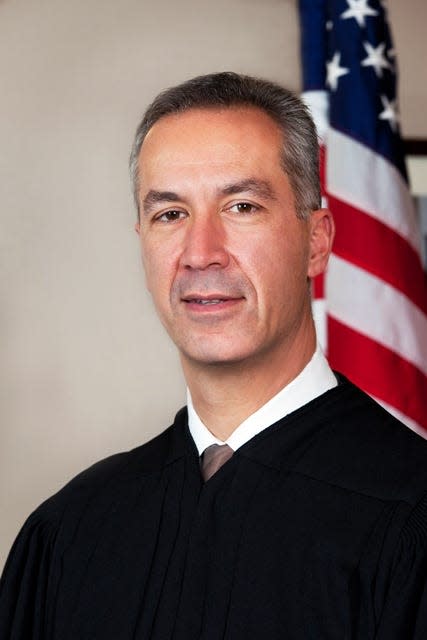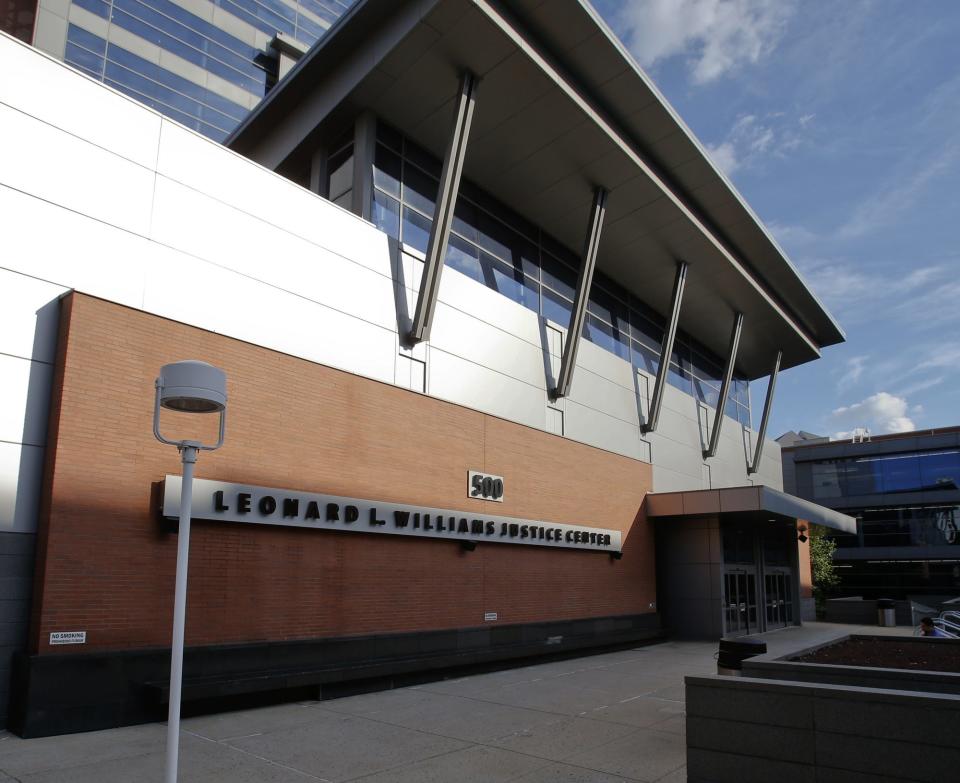Fox News anchors may take the stand in Delaware, but you can't watch it live. Here's why
It has been nearly three decades since Americans were glued to their television sets as defense counsel for O.J. Simpson told jurors, "If (the glove) don't fit, you must acquit."
Last year, footage of testimony from the defamation trial involving actors Johnny Depp and Amber Heard divisively forced its way in front of a massive audience on social media. And just a month ago, millions tuned in to see testimony in actress Gwyneth Paltrow's trial over a skiing collision.
But when the top television personalities for the nation's most-watched cable news network are put under oath and grilled in a billion-dollar defamation trial in Wilmington this week, there will be no live video stream, no images from the courtroom and no audio rebroadcasts for podcasts and nightly news segments.
In fact, anyone rebroadcasting audio or images from the proceeding risks what officials described as "serious court sanction," according to court officials. The court has set up a live audio line where the public can call in to listen, a first for the local Superior Court.
"I have gone as far as I can go with respect to access," said presiding Judge Eric Davis.
JURY SELECTION: Delaware residents will decide outcome of Fox News defamation case. Trial to begin Tuesday
What testimony is expected and where to listen
Dominion Voting Systems filed suit against Fox News and its parent corporation two years ago claiming that the conservative media giant knowingly allowed its television guests, the likes of Rudy Giuliani and Sidney Powell, to spread outlandish lies claiming the Dominion's voting machines had fraudulently caused Donald Trump's 2020 election loss.
The result of the trial could have implications for American news reporting and political discourse as Fox News attorneys claim its anchors were legitimately reporting the statements of newsworthy figures about important matters of the day.
And while it isn't a trial about sex or murder, the case revolves around lies aimed at shaking confidence in the American electoral system, and given the people involved, trial testimony will generate massive interest.
Fox News personalities that are paid millions to address public affairs for a nationwide audience each night are expected to be questioned about the extent they knew their guests were spreading lies aimed at convincing their viewers the election was stolen.

Fox News executives, people who have shaped conservative politics and discourse for decades, are expected to be questioned about whether profits overrode their willingness to question lies aimed at benefitting Trump − lies Dominion attorneys argue that the news organization's conservative customer base was eager to hear.
Most people will hear about what happens through a small army of media reporters expected to descend upon the Wilmington courthouse where the trial is to begin Tuesday.
The court, a state-government arm of Delaware, is making available a live video stream for reporters stationed in an overflow room, as well as a live audio feed that can be accessed via a telephone number. The audio line is "for the public and media to increase access to court proceedings," officials said.
The call-in line is a first for the court hosting the trial. The number hasn't been highly publicized by the state, though it can be found on the court's website. Davis and court officials have emphasized that any rebroadcast of the audio is strictly prohibited.
The public line is (774) 258-6500. Midway through the first day, the call-in line was at capacity and court officials added additional lines: (617) 944-8933, (719) 300-3761, (206) 806-9395.
LIVE UPDATES: Opening statements begin in Fox News defamation trial held in Delaware
Request to rebroadcast denied
Leading up to Tuesday's opening arguments, media organizations filed a last-minute intervention seeking permission to record and rebroadcast raw audio streamed from the courtroom.
The media entities − which include USA Today, Delaware Online/The News Journal, The New York Times, ProPublica and others − argued that the prohibition on rebroadcasting audio effectively cuts off access to members of the public that cannot tune into the live feed because of work, school or other limitations on their daily life.
Rebroadcast would allow the public the ability to witness the trial proceedings without relying on a retelling or reinterpretation by media professionals, the organizations reasoned.

“The voices, the certainty, the hesitancy of witnesses and the force of the argument of lawyers will emerge from the recordings in ways quoted words on a page simply cannot demonstrate,” an attorney representing the media outlets wrote in the court request.
In court filings, Fox News asked Davis to reject the request, arguing it was lodged too late and rebroadcast "risks invading privacy interests; distracting witnesses, jurors, and other trial participants; and compromising the integrity of the trial proceedings."
DOMINION V FOX:Jan. 6 insurrection not relevant in Fox defamation trial, Delaware judge rules
Davis did not elaborate on his reasons for rejecting the request. He said he had consulted with other Superior Court judges and emphasized that the overflow-room video feed and dial-in audio line are unprecedented access in his court.
Delaware court tradition of no cameras
The ruling is in line with judicial tradition in Delaware.
Only the state's Supreme Court hosts a video livestream of its proceedings. Those are typically focused legal debates by attorneys that do not involve the presentation of evidence or jurors. Nearly 20 years ago, the courts briefly engaged a pilot program to allow cameras in civil proceedings that did not involve a jury.
The Fox News trial is the first time that Delaware Superior Court has allowed audio of court proceedings to travel beyond the courtroom gallery. Last year, officials set up a dial-in line for a Chancery Court case involving Elon Musk, the only other such feed in the Delaware courts' recent history.
As a general rule, Delaware does not allow cameras in its courtrooms, and audio recording of court proceedings is strictly prohibited.
Those strict protections sometimes bleed into other aspects of public access. Members of the public are turned away from most state courts when they try to enter with their cellphones. In recent times, officials for Delaware's Superior Court have delayed or sometimes outright rejected public access to evidentiary exhibits presented in murder trials, newsworthy items higher courts have ruled should be public.

Typically, if one wants to find out, word for word, what happened in a Delaware lower court proceeding after its conclusion, they must order an official transcript that can take several days and cost hundreds of dollars for a several-hour-long proceeding.
Delaware Superior Court officials, including Chief Justice Collins J. Seitz, did not respond to an invitation to discuss or comment on court policies.
A longstanding debate over access
Delaware is not unique in not allowing cameras or audio recorders into its court proceedings.
Federal courts generally prohibit such access. The U.S. Supreme Court has not enshrined any absolute right or prohibitions to audio and visual recording of court proceedings so it's left largely up to states or individual jurisdictions to decide how much access is allowed.
That's why viewers were able to see television stars Johnny Depp’s and Amber Heard's dueling testimony in their defamation case in Virginia but there isn't video of Trump pleading "not guilty" in a Manhattan courtroom earlier this month.
And it is a debate that has been around for decades.
RECENT: Fox News sanctioned by Delaware judge for withholding evidence in $1.6B defamation trial
On one side, there is concern that cameras will sully the process in different ways.
Cameras could be a distraction to jurors, they could change the way a witness acts and is perceived by jurors, and a grand-standing attorney could make what should be a terse, professional proceeding into a made-for-television drama.
On the other side is the argument that the public should be able to see the mechanics of justice unfiltered by professional media organizations.
Perception can be important in court: How a witness appears, the inflection of a judge's voice or the precise phrasing of a statement can get lost in a media rewrite or differ from one journalist's account to another.
Steve Wood spent three decades as a prosecutor in Delaware courts and is an instructor for the National Institute of Trial Advocacy. He reasoned that courts are alongside legislatures as the most important public spaces and so the public should see what is happening there.
Technology and expertise in designing such access would mitigate the downsides, said Wood, who is a partner at the Wilmington office of McCarter & English. And on the eve of the most-watched Delaware trial in decades, he argued cameras would give a wider audience a window into how "professional and rigorously fair" Delaware's court system is.
"That is not something to be afraid of," Wood said. "That is something to be proud of."
Contact Xerxes Wilson at (302) 324-2787 or xwilson@delawareonline.com. Follow @Ber_Xerxes on Twitter.
This article originally appeared on Delaware News Journal: Fox News defamation trial: Why you won't be able to watch it live

